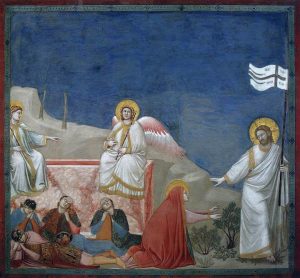HOMILY EASTER SUNDAY 06 – A
Intimacy – A Key to the Kingdom
(Acts 8:5-8; 14-17; 1 Pt 3:15-18; Jn 14:15-21)
********************************************
If you were to summarize the whole bible in one sentence, what would that one sentence be?
The answer: Love your neighbour as yourself.
The gospel today is all about Jesus’ farewell discourse. He is about to leave his disciples to go to the Father. His words are all words of leave taking, a last will and testament, if you will. They surface a profound question: Can the disciples love Jesus after he is gone?
Resurrection faith provides a profound answer – “Yes” – not by cherished memory, nor private experience, but by keeping his commandment, which is to love one another.
The language that the evangelist John uses in this passage is striking for its poignancy. He has Jesus speaking a language of love, of closeness, of relationship, of endearment – of intimacy. It is a language that may even be somewhat embarrassing to those who struggle to express their love for others. However, it is a language that holds a key to understanding the reign of God that Jesus initiated among us.
The key words are in the last paragraph: “They who have my commandments and keep them are those who love me; and those who love me will be loved by my Father, and I will love them and reveal myself to them.
What Jesus is saying here is that if we love him, we will keep his commandment that is to love one another. That is how we can best love him. St. Mother Theresa of Calcutta understood this well, in her words: “What we would like to do for Jesus, whom we cannot see; let us do to our neighbour, whom we can see, and we will be doing it to Jesus.”

Resurrection, Giotto di Bondone
There is more. Jesus continues to say that loving him through our love for others, takes us up into the Father’s loving embrace and opens us up to receiving even more love from Jesus. It is a dynamic circle of love.
Then comes the intriguing, surprising yet key element that most of us miss. “I will love them and reveal myself to them.” What Jesus is saying here is actually quite radical. The best way to encounter Jesus; to experience him; to meet him, is to love others; to see him in others; to experience him in others.
There is a saying “To be closer to God, be closer to people.” That is another way of expressing what Jesus is implying here. One interpretation of this statement of Jesus is that when we love another person by achieving intimacy with that person; when we trust someone else totally; when we accept another person totally as he or she is, Jesus is there, because God is intimate relationship, Father, Son and Holy Spirit, and when we achieve intimacy with someone, God is there and we experience God. Jesus reveals himself to us.
This has tremendous implications for marriages, for friendships, for family life, for religious community life. The closer we can be to one another in trust, honesty, openness, transparency – the more we will experience the presence of the Holy Trinity in our lives.
Tina was a client at a rehabilitation centre for drug and alcohol abuse. One morning she surprised herself by sharing more of her story with her group than she ever thought she would. Her pastor happened to drop in just as she emerged from the group and she shared with him what that session was like for her.
Two things that she said struck the pastor. One was that it got very quiet as she was sharing. He told her that was because she trusted the group at a deeper level than they expected. They sensed that trust, respected it and became very quiet so they could listen attentively. She was loving the group by trusting them, and they were loving her by listening and accepting her as she was. She was experiencing deep love as fellowship.
The second thing she mentioned was that it seemed to her like time stood still. She lost all track of time. The pastor remarked to her that was because with God there is no time. God is love, and so God’s timelessness was present as she opened up out of love and was accepted with love. That was a kingdom moment, a God moment, a priceless experience of God who reveals himself to us through intimacy and love.
Two Oblate priest friends traveled to visit a mission together one weekend. On the way they prayed the rosary, then shared their way around the medicine wheel – how they were doing physically, mentally, emotionally, and relationally in terms of their relationship with God, other people, ourselves, and all of God’s creation. They even touched on how they were dealing with their human sexuality, their Eros or that divine fire that God has placed within every human being as a symbol of our desire for consummation, for union with God.
They then celebrated the Eucharist together with one of the more isolated, small faith communities in that diocese. Reflecting back on that journey, they noted how that experience of warm fellowship, Oblate brotherhood, even intimacy, was a remarkable source of wellbeing, energy and joy for both of them throughout that week. They had experience Oblate priestly and community life at its best, and also a participation in the reign of God. Jesus was truly revealing himself to them through that sharing.
The Eucharist is an intimate moment of love with our God, others and ourselves. It is also a commitment to go and love others as Jesus has loved us, and as we love ourselves.
So, love your neighbour as you love yourself. Strive to achieve intimacy with others, and you will experience God dwelling within you, Father, Son and Holy Spirit. May God bless us all.



